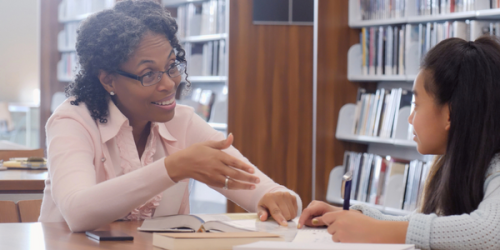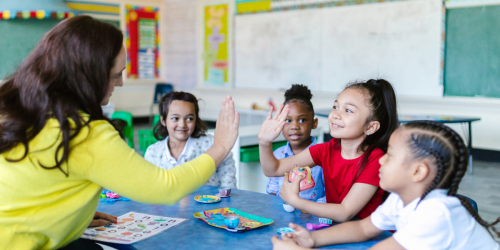The results of the National Assessment of Educational Progress (NAEP), or the “Nation’s Report Card,” came in this week, and the scores confirm what we feared: The largest math score declines ever recorded and decreases in reading scores. The pandemic erased progress and exacerbated inequity. These devastating results confirm an important fact: Teachers—and schools, by extension—matter a great deal to student learning and student well-being.
The education community had been anxiously anticipating the release of the scores—and I am among those edu-nerds who helped to clog the NCES website. More importantly, I am a parent of two public school children in middle and high school. As I reviewed the NAEP data and felt the sorrow of so much lost ground for students, I wondered what other parents and caregivers are thinking right now. What do families expect from our schools today, and what can teachers do to meet those expectations?
Parents and families must be part of the partnership to help students maintain their well-being and also gain back their academic footing. To understand what parents seek now from teachers and schools, I turned to three organizations that have their finger on the parent-pulse: National Parents Union, Learning Heroes, and Bellwether via their Parent Perception Barometer.
What struck me most was the stark difference between how parents perceive their children are doing in school and what the data actually show.
Despite the dismal news from the NAEP and the declines in learning reported on state assessments, fewer than half of parents (43%) report that their child has experienced any learning loss. Another poll shows 84% of parents report their child gets all Bs or above and more than nine in 10 (92%) say their child is at/above grade level, which holds constant regardless of race, ethnicity, or background of the parent respondents.
Hmmm…why the disconnect? Some of it can be explained by our very human (and parent) tendency to think better of our own progeny than children writ large (I would never do that as a parent of two amazing kids…ahem). Some of it may also be that parents don’t understand what “on grade level” means. In fact, many parents have been told for years that their students are earning good grades, but it turns out students’ assignments are below grade level, as TNTP called out in “The Opportunity Myth.” Bellwether concluded that the disconnect “suggests a need to better understand the information parents receive about their child’s academic progress, how they interpret that data, and what actions they feel they are able to take as a result.” Indeed, an organization called EdNavigator sprung up several years ago to provide support to parents to navigate the labyrinth of education issues.
The disconnect also got me thinking about teachers and the need for engaging with parents about four things: 1) What students are expected to know and do in each subject and how those standards relate across grade levels; 2) students’ progress towards those standards; 3) what parents can do to help their children; and 4) what parents can teach us about their children and their needs and assets. Baltimore City Schools CEO Dr. Sonja Santelises calls upon educators to do “reciprocal listening” to intently engage and learn from parents about their priorities and concerns for their children.
To do this kind of parent engagement, teachers themselves need a great deal of knowledge and skill:
- Capacity to collaborate: Teachers need to partner with families on students’ learning and well-being, displaying competence in engaging in dialogue with families about expectations for student learning and success in the classroom, including leveraging families’ cultural and linguistic knowledge and expertise. Some states have built these expectations into their teacher evaluation systems (for more on educator evaluation, stay tuned for NCTQ’s upcoming State of the States report).
- Content knowledge: Teachers need to know the content for the subjects and grades they’re teaching, and also understand how this content builds a foundation for later grades. Teachers need to be able to communicate what’s necessary for students to learn now, why that matters for future learning, and what parents can do to support.
- Pedagogical skill: Teachers need pedagogical skill grounded in the research. Without a firm foundation in pedagogy, including how to understand students’ errors and how to correct them, teachers cannot offer a clear plan to families on where to go next and how to make up for lost learning. For example, teachers need to know the science of reading to be effective reading teachers—and yet many do not. A highly popular Facebook group, “Science of Reading: What I Should Have Learned in College” (with over 180,000 members and growing by the day) frequently gets content-specific pedagogical questions as teachers try to do right by their students and figure out the teaching strategies they should already know.
- Assessment knowledge: Teachers need to be able to administer, analyze, and communicate assessment results to parents—what it measures, what it shows, what it means, and how to support their children based on the results. Interestingly, the National Parents Union reports 62% of parents agree that schools should continue to assess how well students are learning using statewide tests so that we can compare results to previous years and schools can identify areas students may be falling behind or need support. Teachers need to help parents make sense of the assessment results and what they mean for their children; and they need to do so in a way that is specific to each child and opens the door for conversation with each family. When done right, these conversations can offer an opportunity to listen to families’ concerns and needs.
To deeply engage, robustly listen, and actively partner with parents, teachers need the capacity to build inviting and meaningful opportunities for collaboration, content knowledge, pedagogical skill, and assessment knowledge. These are the fundamental building blocks for increasing student well-being and learning.
More like this

Eight ways states can act now to retain an effective, diverse teacher workforce

Establishing positive teacher-student relationships may help boost student outcomes

Making Secretary Cardona’s vision for the teaching profession a reality

Reflections on the pandemic and the power of teachers


